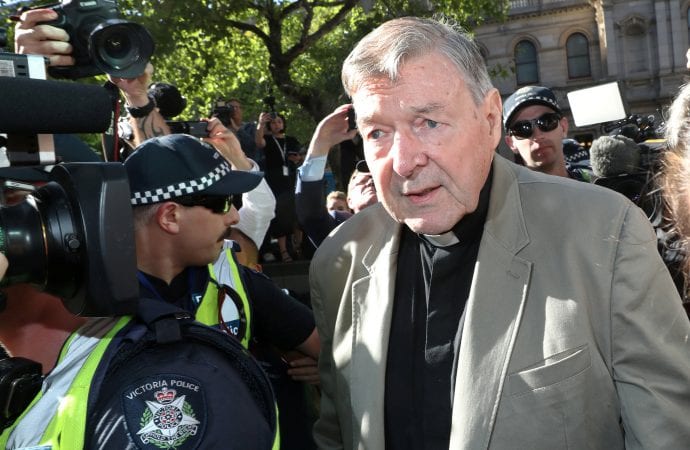
By Christopher White, The Tablet’s National Correspondent
NEW YORK – Cardinal George Pell’s effort to appeal his conviction for sexual abuse was rejected by a Melbourne court on Wednesday in a 2-1 decision, delivering a striking blow to one of the global Catholic Church’s most prominent figures.
Pell is the most senior Catholic official to be found guilty of charges related to sexual abuse. He was found guilty in a jury trial that concluded last December and was sentenced to six years in prison last March.
The 78-year-old cardinal, and the country’s highest-ranking Catholic, was on hand for the court appearance. He will return to Melbourne Assessment Prison where his legal team must weigh whether or not to make another appeal to Australia’s high court.
On hand for the decision was Pell’s brother David, along with a mix of child abuse victims and Pell supporters.
In June 2017, Pell was charged by Australian police for “historical sexual assault offenses,” for crimes dating back to December 1996 when he was the newly minted archbishop of Melbourne, Australia’s second largest city, where he is accused of having orally raped a 13-year-old choirboy and indecently exposing himself in front of another choirboy inside the sacristy of St. Patrick’s Cathedral.
Following an initial trial that lasted for four weeks last August and September that resulted in a hung jury, a second trial last November resulted in a unanimous guilty verdict.
During both trials the prosecution relied heavily on the testimony of one of the choirboys who is now in his thirties. The other alleged victim died of a heroin overdose in 2014.
Pell did not testify at either trial and has consistently maintained his innocence.
During a two-day hearing in June, Pell’s lawyers argued that the events in the Melbourne sacristy, where Pell is alleged to have abused the two choirboys, were “improbable and even impossible” in an environment where priests, altar servers, and other choirboys would have been present and that he would have been unable to commit the alleged crimes due to the heavy robes he would have been wearing at the time.
In 2017, Pell returned to Australia from Rome to defend himself against the charges, taking a leave of absence from his post at the Vatican’s Secretariat for the Economy, where he was tapped in 2014 by Pope Francis to serve as its prefect.
In that capacity, he also served on Francis’s advisory council of cardinals known as the “C-9.” In December 2018, the Vatican confirmed that Francis had sent Pell, along with two other members of the C-9, letters marking the end of their service to the advisory council.
Pell has been one of the most prominent, and at times polarizing, Catholic figures in the English-speaking Catholic world over the last three decades.
After five years of serving as archbishop of Melbourne, he was appointed the archbishop of Sydney, where in 2003, he was made a cardinal by Pope John Paul II and played host to Pope Benedict XVI during his visit to Australia for World Youth Day in 2008.
As he ascended the ranks of the Church hierarchy, the former football player turned priest, garnered a reputation for his strong, and sometimes-brusque defense of Catholic teachings on matters of faith and morals.
Earlier this month, Australian authorities announced that they were investigating a letter said to be penned by Pell and circulated online by his allies who have characterized Pell’s conviction as one resulting from a vendetta against him and the Catholic Church. The handwritten letter offers thanks to the “Support Cardinal Pell” group and encourages readers to “always remember that the Catholic Church is one.”
The Department of Justice of Victoria said in a statement that its prisoners are barred from posting on social media or asking others to post on their behalf. The authenticity of the letter has yet to be verified.
In addition to his criminal proceedings, in February 2019, the Vatican’s Congregation for the Doctrine of the Faith (CDF) commenced its own canonical investigations into Pell. Should he be found guilty, he could face removal from the clerical state.
As the Catholic Church has struggled to turn a page on the global clergy abuse crisis, Australia has been one of the hardest hit countries prompting a Royal Commission inquiry. After a five-year review, the final report, published in 2017, listed 4,756 reported claims of abuse dating between 1950-2015.
